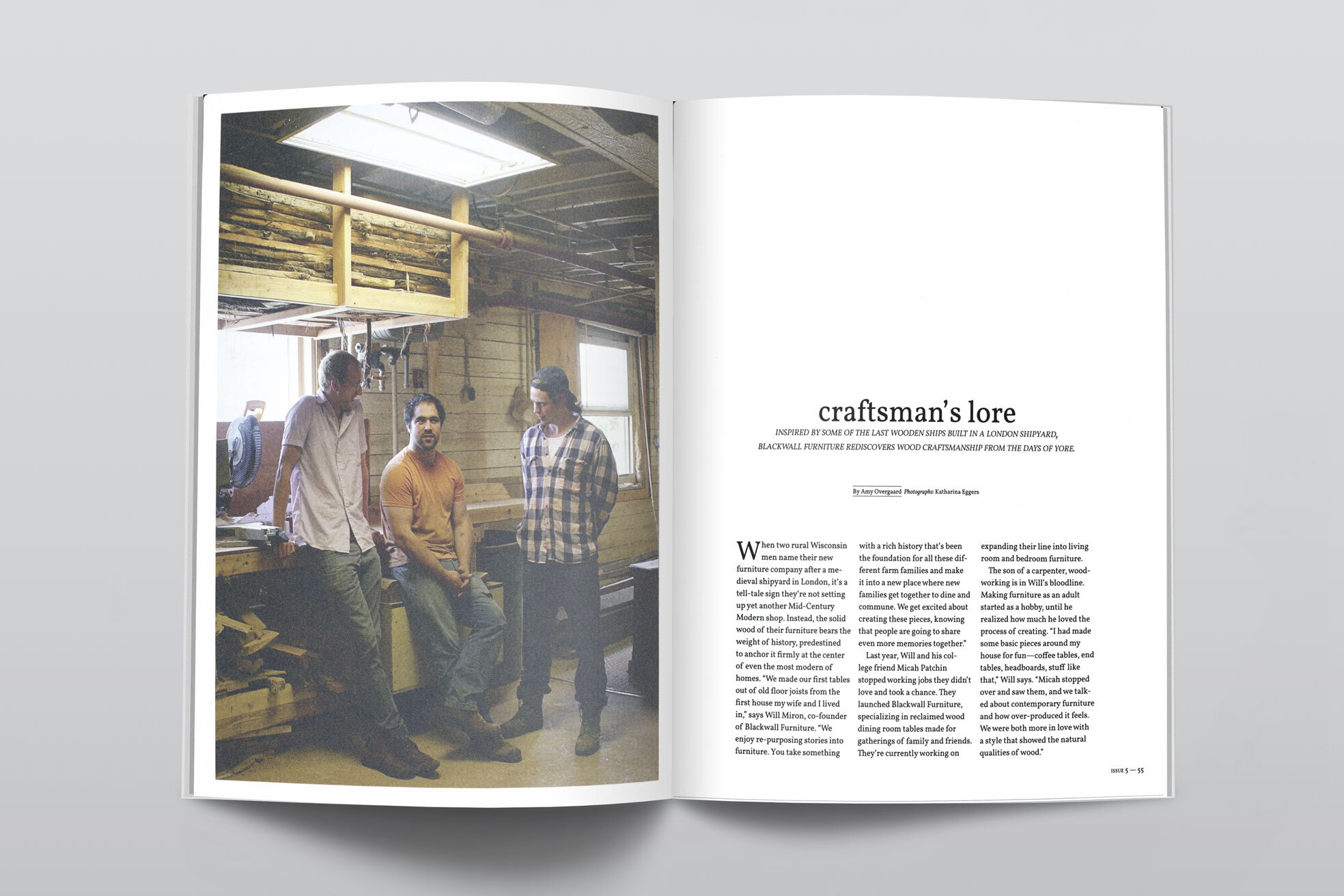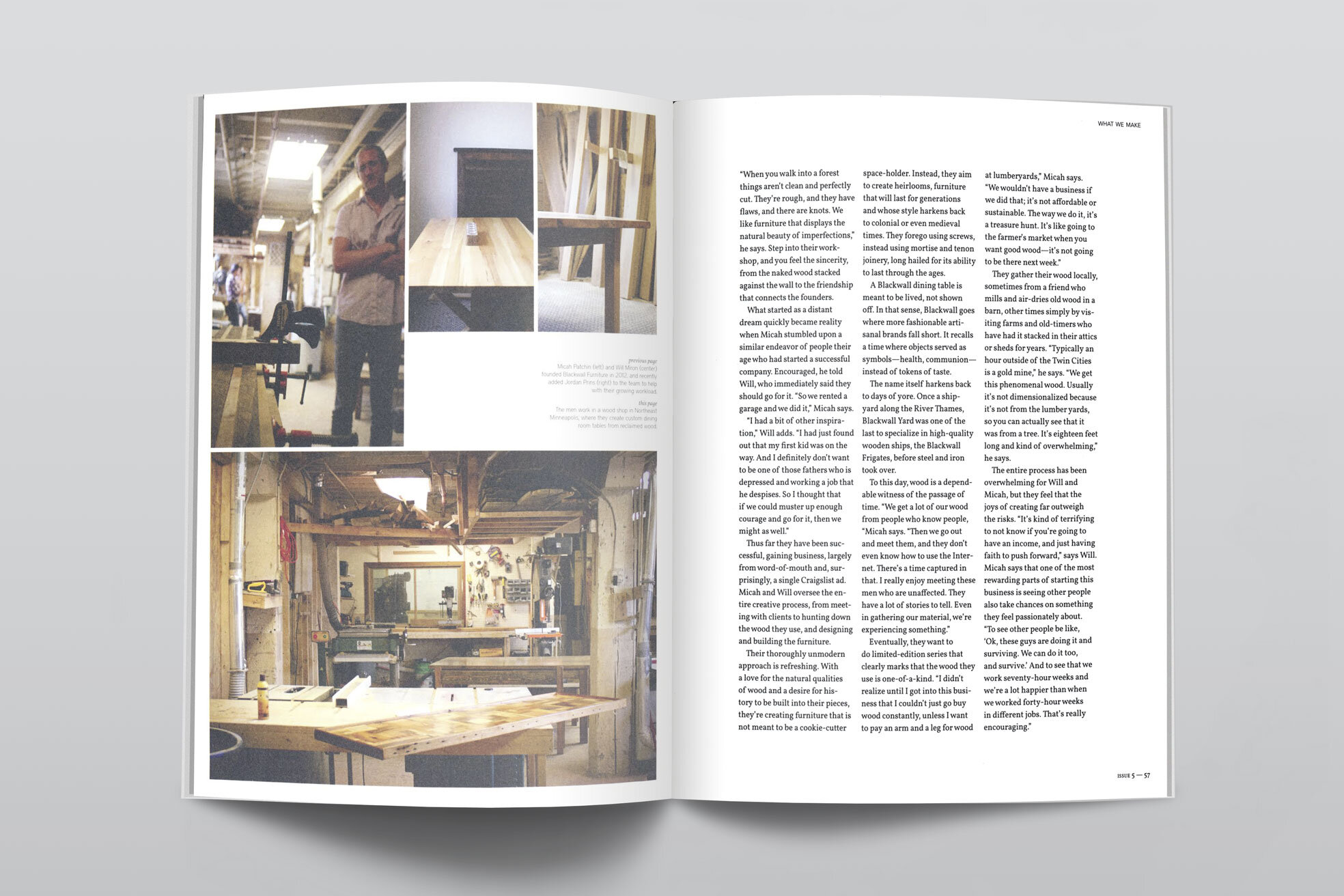Craftsman’s Lore
Thirty Two, Issue 5
Craftsman’s Lore
Inspired by some of the last wooden ships built in a London shipyard,
Blackwall Furniture rediscovers wood craftsmanship from the days of yore.
When two rural Wisconsin men name their new furniture company after a medieval shipyard in London, it’s a tell-tale sign they’re not setting up yet another Mid-Century Modern shop. Instead, the solid wood of their furniture bears the weight of history, predestined to anchor it firmly at the center of even the most modern of homes. “We made our first tables out of old floor joists from the first house my wife and I lived in,” says Will Miron, co-founder of Blackwall Furniture. “We enjoy re-purposing stories into furniture. You take something with a rich history that’s been the foundation for all these different farm families and make it into a new place where new families get together to dine and commune. We get excited about creating these pieces, knowing that people are going to share even more memories together.”
Last year, Will and his college friend Micah Patchin stopped working jobs they didn’t love and took a chance. They launched Blackwall Furniture, specializing in reclaimed wood dining room tables made for gatherings of family and friends. They’re currently working on expanding their line into living room and bedroom furniture.
The son of a carpenter, woodworking is in Will’s bloodline. Making furniture as an adult started as a hobby, until he realized how much he loved the process of creating. “I had made some basic pieces around my house for fun—coffee tables, end tables, headboards, stuff like that,” Will says. “Micah stopped over and saw them, and we talked about contemporary furniture and how over-produced it feels. We were both more in love with a style that showed the natural qualities of wood.”
“When you walk into a forest things aren’t clean and perfectly cut. They’re rough, and they have flaws, and there are knots. We like furniture that displays the natural beauty of imperfections,” he says. Step into their workshop, and you feel the sincerity, from the naked wood stacked against the wall to the friendship that connects the founders.
What started as a distant dream quickly became reality when Micah stumbled upon a similar endeavor of people their age who had started a successful company. Encouraged, he told Will, who immediately said they should go for it. “So we rented a garage and we did it,” Micah says.
“I had a bit of other inspiration,” Will adds. “I had just found out that my first kid was on the way. And I definitely don’t want to be one of those fathers who is depressed and working a job that he despises. So I thought that if we could muster up enough courage and go for it, then we might as well.”
Thus far they have been successful, gaining business, largely from word-of-mouth and, surprisingly, a single Craigslist ad. Micah and Will oversee the entire creative process, from meeting with clients to hunting down the wood they use, and designing and building the furniture.
Their thoroughly unmodern approach is refreshing. With a love for the natural qualities of wood and a desire for history to be built into their pieces, they’re creating furniture that is not meant to be a cookie-cutter space-holder. Instead, they aim to create heirlooms, furniture that will last for generations and whose style harkens back to colonial or even medieval times. They forego using screws, instead using mortise and tenon joinery, long hailed for its ability to last through the ages.
A Blackwall dining table is meant to be lived, not shown off. In that sense, Blackwall goes where more fashionable artisanal brands fall short. It recalls a time where objects served as symbols—health, communion—instead of tokens of taste.
The name itself harkens back to days of yore. Once a shipyard along the River Thames, Blackwall Yard was one of the last to specialize in high-quality wooden ships, the Blackwall Frigates, before steel and iron took over.
To this day, wood is a dependable witness of the passage of time. “We get a lot of our wood from people who know people,” Micah says. “Then we go out and meet them, and they don’t even know how to use the Internet. There’s a time captured in that. I really enjoy meeting these men who are unaffected. They have a lot of stories to tell. Even in gathering our material, we’re experiencing something.”
Eventually, they want to do limited-edition series that clearly marks that the wood they use is one-of-a-kind. “I didn’t realize until I got into this business that I couldn’t just go buy wood constantly, unless I want to pay an arm and a leg for wood at lumberyards,” Micah says. “We wouldn’t have a business if we did that; it’s not affordable or sustainable. The way we do it, it’s a treasure hunt. It’s like going to the farmer’s market when you want good wood—it’s not going to be there next week.”
They gather their wood locally, sometimes from a friend who mills and air-dries old wood in a barn, other times simply by visiting farms and old-timers who have had it stacked in their attics or sheds for years. “Typically an hour outside of the Twin Cities is a gold mine,” he says. “We get this phenomenal wood. Usually it’s not dimensionalized because it’s not from the lumber yards, so you can actually see that it was from a tree. It’s eighteen feet long and kind of overwhelming,” he says.
The entire process has been overwhelming for Will and Micah, but they feel that the joys of creating far outweigh the risks. “It’s kind of terrifying to not know if you’re going to have an income, and just having faith to push forward,” says Will. Micah says that one of the most rewarding parts of starting this business is seeing other people also take chances on something they feel passionately about. “To see other people be like, ‘Ok, these guys are doing it and surviving. We can do it too, and survive.’ And to see that we work seventy-hour weeks and we’re a lot happier than when we worked forty-hour weeks in different jobs. That’s really encouraging.”



